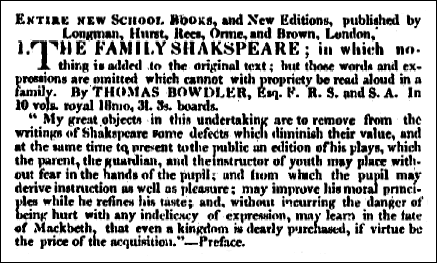BOWDLERISE: To remove material that is considered improper or offensive.
I liked the origin story of the word so here it is:
This advertisement appeared on the front page of the Times of London on 15 December 1818, to announce the publication of a new work:

Bowdler, a man of independent means, had trained as a doctor but following a breakdown in his health spent the rest of his life in charitable undertakings, such as continuing the work of the prison reformer John Howard. Though it was once thought that the Family Shakespeare was his idea, it is now known that his sister Henrietta (also called Harriet), had previously published expurgated versions of 20 of Shakespeare's plays anonymously in 1807 under the same title and that her efforts formed the core of the later publication.
Both Harriet and Thomas were concerned that in Shakespeare’s works, as he put it in the introduction to the 1818 work: “Many words and expressions occur which are of so indecent a nature as to render it highly desirable that they should be erased.” He also complained about the unnecessary and frivolous allusions to Scripture, which “call imperiously for their erasement”. Alas, the Bowdlers’ attempts to sanitise the works of the master played sad havoc with their quality and Thomas was bitterly criticised for his prudery and heavy-handed editing (though the ten-volume work went through five editions by the 1860s). He died in 1825, having done much the same job on Gibbon’s History of the Decline and Fall of the Roman Empire.
The verb is recorded as first used by General Perronet Thompson in 1836, in his Letters of a Representative to his Constituents during the session of 1836. Though the Family Shakespeare has long since vanished from booksellers’ shelves, the name of its editor (or editors) lives on as a byword for prissy censorship.
http://www.worldwidewords.org/weirdwords/ww-bow1.htm
1 comment:
I found that very interesting and just for your information, I got the definition correct the first time. I knew what it meant but I didn't know where the word came from. Now I know!
Post a Comment